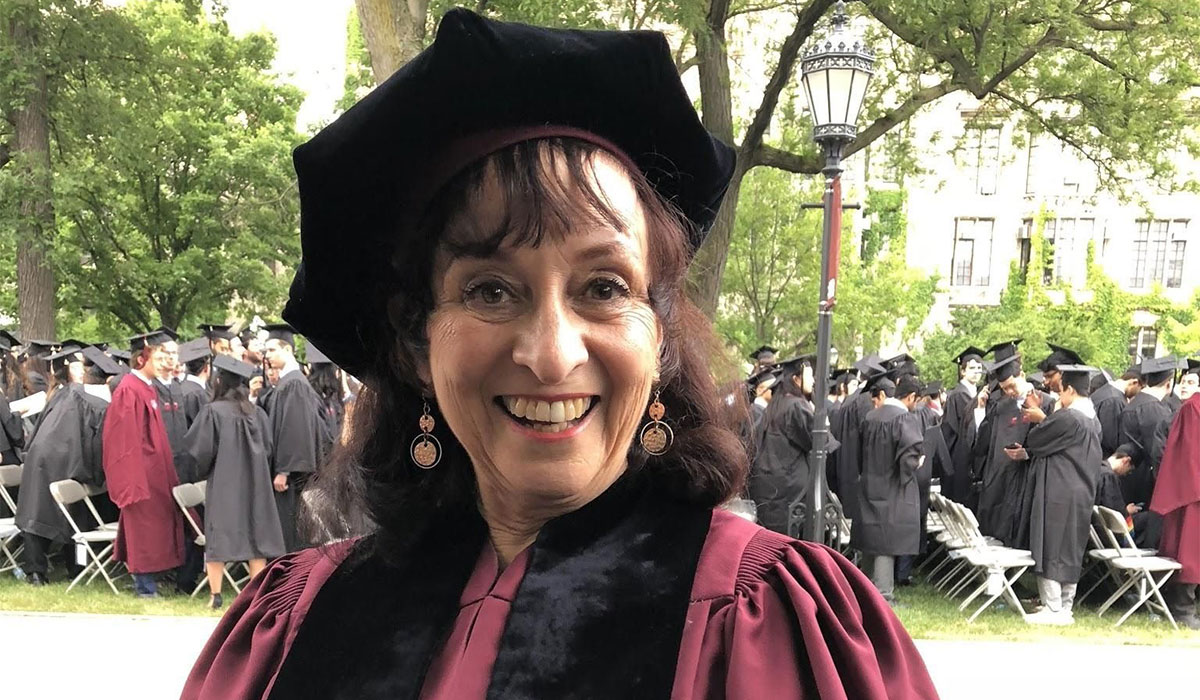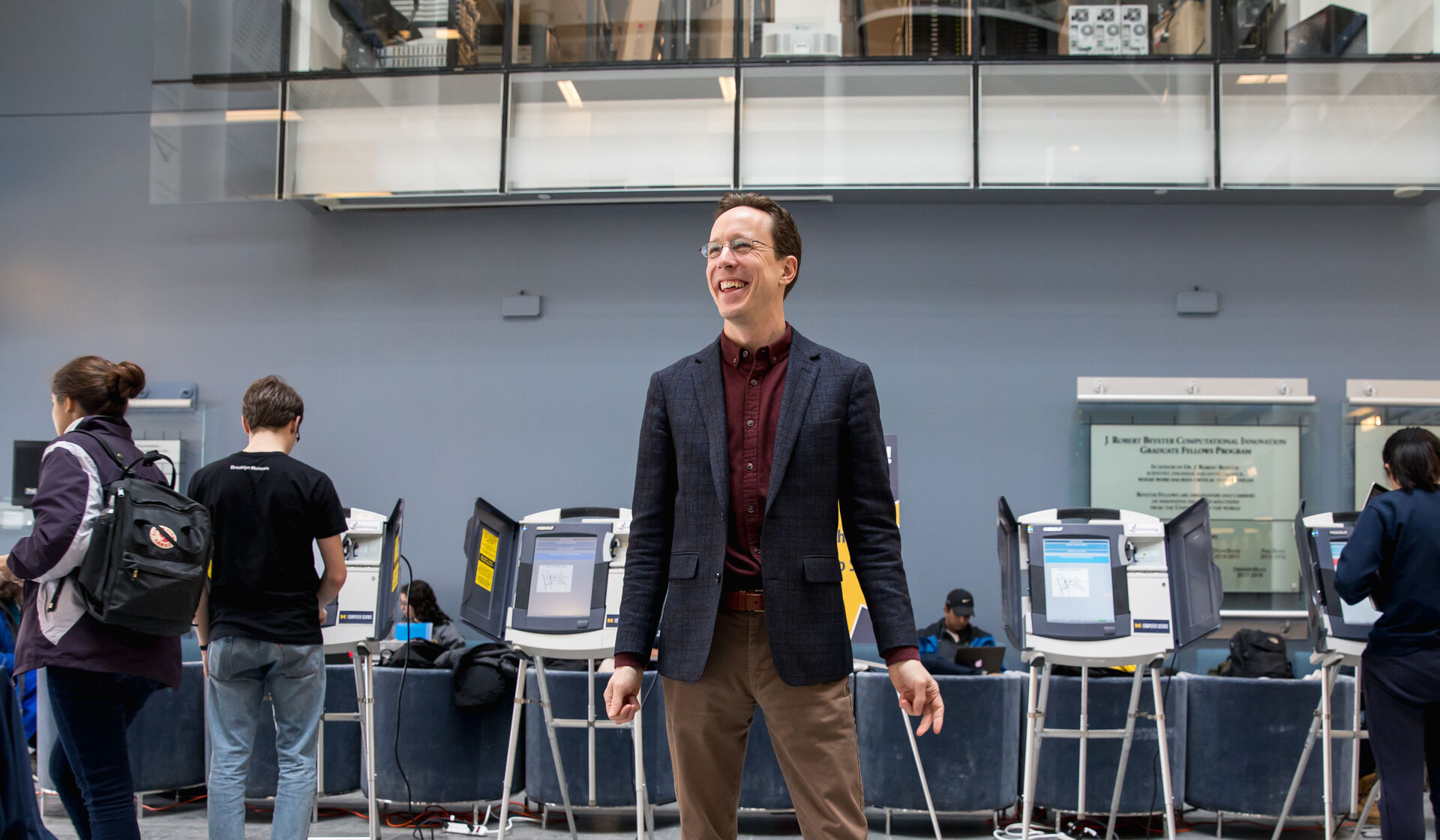Reflecting back to 1971, Cheryl Sundari Dembe, ’68, describes herself as an ambitious young scientist eager to make her mark. A pair of tragic events, however, hindered her progress, sending Dembe down an unforeseen path that would find her in the #MeToo era seeking to reclaim a lost goal and make peace with what might have been.
In 1968, the Cleveland native had earned her degree in physical chemistry from U-M, relishing a vibrant era of science characterized by the space race and an unrelenting hunger for understanding.
“If I could choose 1,000 times over, I’d still choose Michigan,” Dembe says. “There was acceptance at Michigan and room for everyone to be themselves.”
Upon leaving Ann Arbor, she enrolled in a graduate chemistry program at the University of Chicago, one of seven women in the 46-member class. In the course of her PhD research, Dembe designed the world’s coldest stable system at the time (0.02 Kelvin from absolute zero), developed thermometry to measure temperatures in that region, and investigated quantized vortices generated in that superfluid Helium-3/Helium-4 dilution refrigerator. “I was a serious, dedicated scientist on a journey for truth in science,” she says.
Dembe remained determined and optimistic, feelings that accelerated when her adviser, Lothar Meyer, told her she was finished. “Write it up,” he directed. Ten days later, Meyer died unexpectedly and Dembe’s world began swirling. The chemistry department informed her that the professor capable of overseeing her PhD research refused to accept a woman into his group. She would have to begin a new project with a new adviser.
“I didn’t even think to question it,” Dembe says. “Women weren’t supposed to be serious scientists, and we were privileged women being allowed into a men’s world.”
Then tragedy struck again: One week after Meyer’s death, Dembe was sexually assaulted in her Chicago apartment.
While the department sent flowers, she otherwise received no counseling, guidance, or support and felt alone and numb, her once-bright future darkened by uncertainty. “I had been told what I couldn’t do, not what I could,” she says. Frustrated, Dembe left Chicago with her master’s degree and ventured to California, where she eventually settled into a teaching position at Diablo Valley College in Pleasant Hill and carved out a distinguished 34-year career.
And she marched ahead. Dembe married and had two children. She has traveled to 45 countries, pursued a lifelong passion for music by singing in choirs (she has a YouTube music channel), and tossed herself into the study of metaphysics, an effort that culminated in the publication of a 2016 book titled “The Choice of Happiness: Glimpses from an Extraordinary Ordinary Scientific Mystical Life.”
Still, she confesses, the past gnawed at her, plagued by questions of what might have been, especially when she discovered that Stanford University professor Douglas Osheroff won the 1996 Nobel Prize in Physics for work carrying similarities to Dembe’s research.
In 2000, Dembe contacted Osheroff, who mentioned that he had heard of Dembe’s group and its work. Osheroff believed Dembe should have received her PhD and encouraged her to contact the University of Chicago. She crafted a note to the department chair. Crickets.
“ as if I didn’t exist,” she says. Dembe largely buried her frustration until a 2018 #MeToo group reignited action. She penned a letter to the University of Chicago president detailing her situation and offering potential resolutions. Within days, university administrators reached out and a professor was assigned to review her data—some 500 pages Dembe had preserved for more than five decades. “It’s a good thing I’m a historian of my own life,” she jokes.
Following a committee review by chemistry faculty, who considered her work innovative and original, the University of Chicago awarded Dembe her PhD—48 years after she had left the university amid disheartening circumstances. Last June, she walked in convocation ceremonies before family and friends.
“It felt like Cinderella’s fairy godmother came to me and said, ‘My dear, you’ve always been a princess,’” says Dembe, acknowledging that the degree has helped erase years of inner thoughts that she “didn’t make it.”
While Dembe wonders where her career might have led, and the minds she might have interacted with, she finds comfort and confidence in the present, hopeful her story inspires others to persevere. Since the degree was awarded, Dembe has been asked to speak and share her story with many institutions, including scientists at Stanford University, the University of Chicago, and the American Association of Women.
“There’s a way through the morass for anyone who’s felt unjustly treated, overlooked, or unheard,” she says. “I have the feeling I am just beginning my career.”
Daniel P. Smith is a Chicago-based journalist. In previous issues of Michigan Alumnus magazine, he has profiled U-M alumni entrepreneurs such as Five Guys Burgers and Fries founder Jerry Murrell and business mogul Sam Zell.





